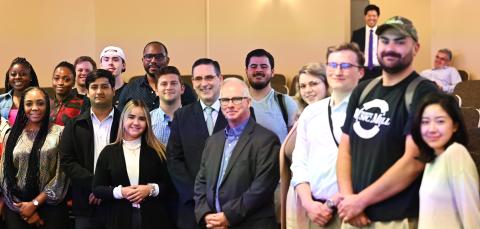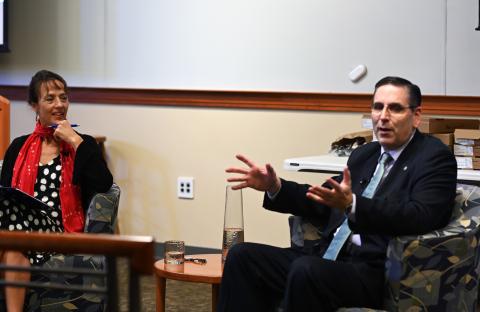Judge Gustavo A. Gelpi on His Beginnings as an Attorney and His Judicial Journey: ‘You have to find your niche.’
Judge Gustavo A. Gelpi has some hard-won advice for law students: “Work hard, work hard, work harder, work even harder,” Gelpi said, quoting his mentor, the late Judge Norman H. Stahl, during a recent visit to UNH Franklin Pierce School of Law.
Judge Gelpi, who serves on the U.S. Court of Appeals for the First Circuit in Puerto Rico, discussed his long and varied career during a conversation moderated by Laura Knoy, Community Engagement Director for the Warren B. Rudman Center for Justice, Leadership & Public Service. (Quotes in this article have been edited lightly for clarity.)

Professor John Greabe and Judge Gustavo A. Gelpi with UNH Franklin Pierce School of Law students.
“I was not a great trial litigator, but I compensated by working harder, by preparing harder, and then at the appellate level I felt more comfortable,” Gelpi said. “You have to find your niche.”
Gelpi, who was born and raised in Puerto Rico, eventually found his niche in the judiciary. In 2001, he was appointed U.S. Magistrate Judge in the U.S. District Court for the District of Puerto Rico. In 2006, President George W. Bush appointed him as U.S. District Court Judge for the District of Puerto Rico, where he also served as Chief Judge. In 2021, President Joseph Biden appointed him to the United States Court of Appeals for the First Circuit.
Whatever legal field you find yourself in, seek out ways to expand your knowledge and experience, Gelpi advised an audience that included students, staff, and faculty. “If you’re in general practice or a law firm and you’re doing corporate law or you’re doing litigation and there’s an opportunity to do an immigration case, do an immigration case, do a family case, do an appeal, try to do as much as you can.”
In addition to working hard, Gelpi urged students to use social media with caution:
“Eventually you may find yourself a judge at the state or federal level, or prosecutor, or have other jobs requiring background checks,” he said. “If you’re big into social media, you have to be careful about what you post today or what you write because it can come back to haunt you.”
And, he said, try to keep your finances in order when it comes to student debt and other matters. “It’s not bad to have debt but make sure you pay on time because if you have issues, like bankruptcy issues or debt issues, you’re not going to pass a background check.”
Gelpi also cautioned against taking short cuts – reading case summaries instead of the entire case and over-relying on technology.
Attorney Beginnings
As an unincorporated territory of the United States, Puerto Rico is excluded from the electoral process. Residents, although U.S. citizens, cannot vote for president or Congress.
“I am the only United States Court of Appeals judge in the entire nation who cannot vote for president because I am still domiciled in Puerto Rico,” Gelpi said.

Rudman Center Community Engagement Director Laura Knoy with Judge Gustavo A. Gelpi who serves on the U.S. Court of Appeals for the First Circuit in Puerto Rico.
The judicial system in Puerto Rico, however, functions similarly to the rest of the country. The U.S. Court of Appeals for the First Circuit includes Maine, Massachusetts, New Hampshire, Puerto Rico and Rhode Island.
Although Gelpi spent most of his career as a judge, he started out working as an attorney, including as an assistant federal public defender.
“I did trials, appeals, habeas corpus proceedings, suppressions, bail hearings – I was meeting with my clients, day in, day out, going to the federal detention center, and it was quite an experience. I tried cases from A to Z – drugs, weapons, immigration cases, to name a few.”
As Solicitor General of Puerto Rico, he handled criminal and civil appeals and argued before the First Circuit and the Puerto Rico Supreme Court.
“Sometimes when you’re in trial as an attorney, you have to make split-second decisions,” he said. “You can be prepared for a trial and then all of a sudden, a witness says something you were not prepared for, or your own witness had not told you about it, and you think ‘What am I going to do now?’”
“I think the most important thing you have to remember as an attorney is that you are officers of the court, so you have to make sure the facts are real, that they’re true. You cannot mislead the court. You have all these ethical obligations and a duty of zealousness to your client.”
His experience as an attorney also informs how he conducts himself as a judge, he said.
“I realize attorneys are pressured. I pressure them also,” he said. “I got pressured by judges to move the case along. But at the same time, you have to understand. Sometimes you have to take a break or give the attorney an extra day.”
When it comes to writing briefs, Gelpi advised lawyers to avoid rehashing facts. “That doesn’t go anywhere,” he said. “You need to know the standard of review. You have to look for arguments of law, you have to stick to precedent.”
As for oral arguments: “Just reading? That’s a no-no,” he said. “You have to memorize everything, know the cases, know what the precedent is. If the judge asks a question, answer that question.”
The challenges of judging
Although President Biden two years ago was hailed for nominating a diverse slate of judicial nominees, including Judge Gelpi, Biden has been criticized more recently for not moving quickly enough to appoint judges of Latino descent.
But Gelpi credits Biden for his efforts and said he sees a healthy diversity in the judicial system. “If you go back 30 years, in most courts you would probably see all men. It was basically homogenous,” he said. “Now they are a reflection of the society we live in, and you see judges from all walks of life, from all different backgrounds.” When asked how being from Puerto Rico affects his work, he said: “A judge is a judge wherever he’s from, regardless of his background.”
And being a judge, Gelpi said, is not for the “light of heart.”
“Sentencing is the toughest part. In 15 years as a district court judge, I sentenced over 4,000 individuals. And I always slept well. I never had any issues. But it is something very delicate,” he said. “It’s not a mechanical process. You have to individualize the defendant.”
The sentencing statute, 18 U.S. § 3553 (a), requires a sentence to be sufficient but not greater than necessary, he said. “You have to look at the defendant’s individual characteristics. You also have to see his role in the offense, the facts of the case and then you do the magic equation, and you see how much this person should be sentenced. And it’s not a simple process.”
Mandatory minimums, in a sense, simplify matters. “Using a fake passport or Social Security, it’s automatically 2 years in prison, no matter what. Drug cases with certain quantities require a 10-year mandatory minimum,” he said. “Those are easy to calculate. But when you have discretion, from zero for a probationary sentence to 25 years, for example, those are the tougher cases.”
Gelpi said there’s been talk that judges may someday use AI to decide summary judgements. “But I have to tell you, you can’t sentence somebody with AI or ChatGPT telling you what to do,” he said. “I can see the person crying, being repentant. I can see from the person’s report that this person has 4 kids, he’s been out on bond for little over a year, he’s rehabilitated himself, he’s not a violent offender.”
When Gelpi isn’t in court, you might find him courtside, watching basketball. He is a huge basketball fan and once played with some aspiration. His favorite player is Larry Bird of Boston Celtics fame.
“He was probably one of the best players, but he was slow and not athletic. But he worked so hard. He was the best. I think that to me was an example.”
